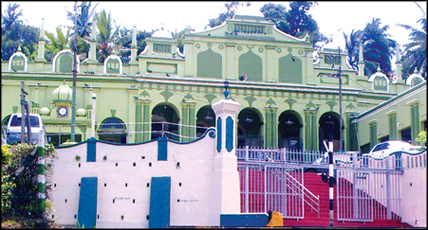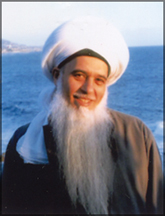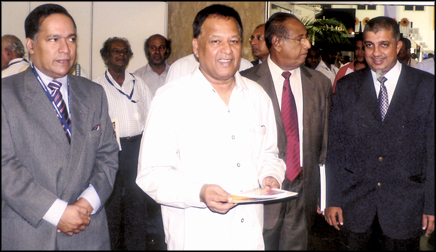Islam
Islamic views on corruption
Alhaj A. M. M. Rauf
How does Islam view corruption? It can take numerous open and
sophisticated forms, both monetary and, non-monetary, making it quite an
elusive and accomplished art. The most commonly known forms are bribery,
gifts, embezzlement and misappropriation. This need not be for
individual transactions but may be institutional.
 |
|
Century old historical Kandy Meeran
Maccam Jummah Mosque and Shiek Seyyed Shihabudeen
Woliyullah’s Maqbarah.
Picture by H. M. Mansoor, Kandy group correspondent |
Allah says, "And it is not possible for a Prophet to act dishonesty,
and whoever acts dishonestly shall bring with him that about which he
has been dishonest, on the Day of Resurrection.
Then shall every soul be fully paid what it has earned, and they
shall not be wronged" (3:162) "And do not devour your wealth among
yourselves through falsehood and offer it not as bribe to the
authorities that you may knowingly devour a part of the wealth of other
people with injustice. (2:189)" O ye who believe! Prove not false to
Allah and the Messenger, nor prove false to your trusts knowingly. And
know that your possessions and your children are but a trial and that it
is Allah with whom is a great reward (8:28-9).
The holy Prophet (please be upon him) said "Allah will accept only
that which is earned through lawful means" (Muslim) "The Charity of a
person who earns by unlawful means and then gives it away will not be
accepted and his expenditure will be devoid of blessing" (Ahmad)
"Allah's curse on the one who offers and the one who accepts bribe". (Ibn
Maja).
"If a person derived a benefit over and above what he was officially
entitled to be committed a breach of trust or was a thief" (Tirmidhi).
The holy Prophet appointed. Abdullah bin Rawaha (RA) to collect Muslims'
share in the produce of the Jews of Khyber who were allowed to cultivate
the land and share the produce with Muslims. They tried to bribe him for
which they had made a collection by selling these ladies jewellery.
He however refused to oblige them saying, "O Jews, I deem you the
worst of all creatures of Allah. Even so, I do not want to be unjust
with you. What you are offering me is bribe which is forbidden. We do
not take it". This made the Jews say, "This is what is holding up the
sky and earth".
Gifts to officials is a very sophisticated way of cultivating or
influencing them for undue favours. This is a concealed form of bribery.
Once the holy Prophet appointed a person for collecting Zakat. On
return, he reported "This and this I have collected as Zakat and that
and that are gifts presented to me". Thereupon the holy Prophet ascended
the pulpit, praised and glorified Allah and said, "I appoint a man among
you to carry out some duty in connection with that which Allah has
committed to me and he comes back and say, "This is yours and that has
been presented to me as gift.
"If he is telling the truth, why did he not sit in the house of his
father or mother so that his gifts would have come to him? By Allah, if
any one of you should take anything to which he has no right, he will
meet Allah on the Day of Judgement carrying that thing. So let me not
see any of you meet Allah carrying a granting camel or a mooing cow or a
bleating goat".
The point is further emphasised in a Hadith: "When I appoint someone
among you to public office and he puts away by stealth a needle or even
something less, that is embezzlement, and he will be called upon to
produce it an the Day of Judgement" (Muslim). Embezzlement is such a
serious sin that it can wipe out virtues including martyrdom". Once an
official presented two pillow covers to Hazrat Umar's (RA) wife. As he
came to know of it, he said "Allah's curse on them. When they want some
favour and cannot influence me, they try to use my family. "With this,
he pulled out the pillows from under those who were then using them and
start tearing them apart. The maid came rushing to inform him that the
cotton in them belonged to the family. He removed the stuff and gave the
covers to two deserving ladies.
The rules in early period of Islam did not tolerate any kind of
preferential treatment, even if it was permissible. Utba bin Farqad (RA)
had a special dish of Azerbaijan made of dates and cream, prepared for
Hazrat Umar (RA). On receipt he asked the courier whether all Muslim
troops were served that food. When he replied in the negative, Hazrat
Umar refused to accept it and wrote back to Utba (RA). "This wealth is
not the result of your or your family's exertion. Feed the Muslims what
you eat yourself. "This attitude permeated the entire administration.
Islam offers a concept of the basic minimum wage. The holy Prophet
said, "A son of Adam is entitled to three things; a dwelling to live in,
a garment to cover his nakedness, a piece of bread and water". (Tirmidhi).
He also said: If any one is appointed to a public office, he can
construct a house, if he is without it, buy a ride, if he has none, and
engage a servant, if he is none, and engage a servant, if he is without
it. Besides, if he accumulates wealth or a herd of camels, he will be
raised as a thief or cheat on the Day of Judgement".
On assuming office, Hazrat Umar (RA) consulted Muslims about how much
was permissible for a ruler. The view offered was: "For himself, what is
sufficient to him and his family,nothing less or nothing more. A dress
for him and his family which may be appropriate to the season. Two
animals for riding in the cause of Allah, for personal use and for
performing the Pilgrimage and Umar. "Hazrat Ali (RA), when specifically
asked about his view, advised him, "Do not take more than what is just
adequate for you and your family".
In dress Hazrat Umar (RA) was wearing when he entered Jerusalem as
the conqueror of the them mighty Roman Empire, was a shirt with numerous
patches despite a suggestion by the Muslim generals present there to him
to be more presentable. This aspect is well recorded and is an object
lesson for Muslim rules.
Corruption is a very elusive concept and has many nuances.
(The writer is a retired officer of the Colombo
University.)
Let's educate each other and work for justice
**********
Excerpts of a speech delivered by Ihtisham
Hibathullah of Al-Jazeera TV and former Media Spokesman of Muslim
Council of Britain at the Office Bearers meeting of All Ceylon Muslim
League Youth Fronts (ACUMLYF).
***********
I feel privileged today to talk a few words among you on the issue of
the current problems faced by the Muslim community in Sri Lanka. In fact
I think I am least qualified to speak about this topic because I was out
of the country for about 19 years.
However challenges faced by our community is not a new one and from
time to time the former Muslim leaders have also come across such bad
situations. It is also a worldwide challenge for Muslims. Even at the
time of our Prophet Muhammed (sal) it was present but the challenges
were in different shapes.
In today's context the crunch of the problem is 'Is change possible?'
'Can we overcome the problems?' The anti-Muslim sentiments of other
communities are created - why and by whom? Isn't it by our own selves?
We are fragile and hence we cannot face them. We don't consider us as
those who should work for all people irrespective of caste, creed or
ethnicity. So Islamphobia arises.
Here in our country we are fortunate that we do have groups of people
like you all who are prepared to take up responsibilities and give
leadership like our forefathers did. May be the majority in the
community don't come forward or bother about anything. But those who
come forward must unite and find the right way to face the challenges.
In my own experience in Britain we had to face a big challenge after
the September 11 incident. Islamophobia was on the rise and we had an
enormous task. We had two things to do. Either:
1. To go back and sit blank saying we are foreigners to the country.
OR
2. To go forward with courage and say "No! We are part of the British
Society. Our children's future is here".
Yes, we did. We voiced as British Muslims. Of course we had to fight
against media onslaught and prove to them whom we are.
I had an encounter with Britain's SUN newspaper when they wrote
against us. I went and met them, had a cordial discussion. I told him
"Yes the fault is in us too. We take 50% blame for we did not explain
whom we are. But the other 50% is in the newsroom.
 |
|
Ihtisham Hibathullah of Al-Jazeera TV
and former Media Spokesman of Muslim Council of Britain
delivering the speech at ACUMLYF office. ACUMLYF National
President N. M. Ameen, National Secretary Rasheed M.
Imhtiyaz, Presidential Advisor and Media Ombudsman Al-Haj A.
H. M. Azwer and office bearers are in the picture. |
We had a long discussion. After that when Pakistan's Kashimir
earthquake occurred we organised a relief campaign in support of the
victims. Spoke to the SUN newspaper and got them engaged in the relief
support campaign and showed whom we are and succeeded in changing their
views on Muslims.
Likewise here too the challenges should be dealt with in a systematic
way. We have to change others' perception about us. This is an important
and challenging task.
We know that among the first revelations in Mecca were the verses
"Unto you is your religion and unto me is my religion". What does this 'Ayath'
say? It says that - we agree to disagree in worship -. In Medina the
first work the Prophet did was enacting the 1st constitution in history
that gave the due rights to the non-Muslim communities.
Here we are taught as to how to work with other communities. What a
lot of examples could we derive from the life of Prophet (sal)? Once the
Prophet stood up in respect when he saw the funeral procession of a Jew.
How many of us are following this?
So it is important that we prioritise the issue without fighting for
a small one while the big and the necessary one is gone. Establish
dialogues with the majority and mobilise the masses, both Muslims and
non-Muslims for common causes. Let us educate each other and work for
justice.
Shaykh Hisham Muhammad Kabbani
Shaykh Hisham Muhammad Kabbani is a scholar and Sufi Shaykh from the
Middle East. He graduated from the American University of Beirut in
Chemistry. From there he went to Belgium, to continue his Medical Degree
in Louvain.
Then he received his Islamic Law Degree from Damascus. From his
childhood, he accompanied Shaykh 'Abdullah ad-Daghestani and Shaykh
Muhammad Nazim al-Haqqani, the grandshaikhs of the Most Distinguished
Naqushbandi Order in this time. He travelled extensively throughout the
Middle East, Europe, and the Far East in the company of his Shaykh.
 In 1991 he moved to America and there established the foundation of
the Naqshbandi-Haqqani Sufi Order of America. In 1991 he moved to America and there established the foundation of
the Naqshbandi-Haqqani Sufi Order of America.
Since then, he has opened thirteen Sufi centers in Canada and the
United States. He has lectured in many universities including Oxford,
the University of California at Berkeley, the University of Chicago,
Columbia University,
Howard, McGill, Concordia, Dawson College, as well as in many
spiritual and religious centers throughout North America, Europe, the
Far East and the Middle East.
Shaykh Hisham Kabbani's work wherever he goes is to spread the Sufi
teachings of the brotherhood of mankind and the Unity of belief in God
that is present in all religions and spiritual paths. His efforts are
directed at bringing the diverse spectrum of religions and spiritual
paths into harmony and concord, in recognition of mankind's
responsibility as caretaker of this fragile planet and of one another.
Shaykh Hisham, as a Sufi Shaykh has been given the authority and
permission to guide his followers to the Love of God and to the stations
to which they have been destined by their Creator.
His arduous spiritual training of 40 years at the hands of his
grandshaykh and his shaykh, has endowed him with the sublime qualities
of wisdom, light, intellect, and compassion necessary for a true Master
on the Path.
Shaykh Hisham's outreach mission in the Americas is his unique
contribution to the Endeavour of Humankind in reaching for its highest
destiny - nearness to God. His endeavors to bring unity of hearts in
their movement towards the Divine Essence is what may be his greatest
legacy to the West.
The significance and philosophy of Hajj
Every nation and society has a centre of unity where they get
together to worship God. They see prosperity and culture as relics of
unity. People of the society get to know each other and understand each
other's difficulties.
They form a unified front to remove these difficulties and achieve
their goals. Allah says in the Holy Quran: "And to every people We
appointed rites of sacrifice, that they might mention the name of
Allah..." (22:34)
With this idea, Hajj has been made a pinnacle of worship in order
that Muslims who gather to perform Hajj can praise their Lord and
Master, be thankful for His blessings, and humbly pray to Him for the
removal of their difficulties. Muslims living in various parts of the
world get to know each other, lay the foundation of social culture, give
advice to each other, and provide opportunity for collective struggle.
An adult Muslim of a sane mind, an able body and having means to bear
the expenses must perform this act of worship once in his/her lifetime.
There should be peace on the way to Mecca and there should be no
hindrance or restriction in travelling to Mecca. Hajj is not obligatory
for children, the sick, and those who are unable to bear the expenses
for Hajj.
There are specific months for performing the Hajj and are called
"Months of Pilgrimage."
These three Islamic months are Shawwal, Ze-Qa'd and Dul-Hajj. During
these three "Months of Hajj", one prepares for the pilgrimage, attains
good morals, and completes other physical conditions for the pilgrimage.
All the essential duties of the pilgrimage have to be completed
between 8th and the 13th day of Dul-Hajj. Additional tawaaf (circling
around the Ka'ba), however, may be performed until the end of the month
of Dul-Hajj.
 |
 |
| The official journal of
the Sri Lanka Gem and Jewellery Association “Malawa” was
presented to the Enterprise Development and Investment
Promotion Minister, Dr. Sarath Amunugama at the BMICH
recently. SL Gem and Jewellery Association President Macky
Hashim and Secretary Ziqufy Ismail and SL Gem and Jewellery
Authority Chairman Hasitha Thilakarathne were also present.
Picture by Ruzaik Farook |
The mosque representatives in Eravur
were given dry rations on the initiative of the Minister of
Eastern Provincial Council, M.L.A.M. Hizbullah. Here the co-ordinator
to the Minister, S. Sinna Lebbe hands over the dry ration to
a mosque representative. Private Secretary to the Minister
M.K. Badurdeen is also present.
Picture by M.I. Farook, Batticaloa District Group
correspondent |
 |
|
Dr. Deen Mohamed, Vice Chancellor,
Islamic University, Qatar is seen delivering the keynote
address at the China Fort, Fassiya Grand Mosque, Beruwala
where the annual Burda Majilis was conducted. Picture by
Beruwala special corr., B.M. Mukthar |
|

